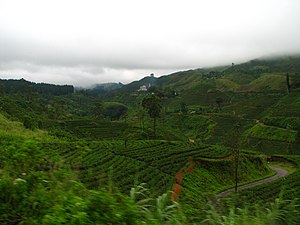Does that brand of tea ring a bell? To Sri Lankans, it does - Ceylon tea remains one of this nation's most valuable exports and is a mainstay of the island's economy. From Wikipedia, "Tea production in Sri Lanka, formerly Ceylon, is of high importance to the Sri Lankan economy and the world market. The country is the world's fourth largest producer of tea and the industry is one of the country's main sources of foreign exchange and a significant source of income for laborers, with tea accounting for 15% of the GDP, generating roughly $700 million annually. In 1995 Sri Lanka was the world's leading exporter of tea, ... with 23% of the total world export, but it has since been surpassed by Kenya. The tea sector employs, directly or indirectly over 1 million people ... The most important foreign markets for Sri Lankan tea are former Soviet bloc countries, the United Arab Emirates, Turkey, Iraq, Iran, UK, Japan, Saudi Arabia, Syria and Libya."
Therefore, Ceylon tea, will soon be the only item that will retain the name Ceylon, as the government has now announced that any other government building or reference to its old colonial name will be removed.
As a quick refresher, this little country off the tip of India (about the size of West Virginia), was ruled by the British colonialists (along with India, Pakistan, and now Bangladesh) until political independence was granted in 1948, though Sri Lanka only became a fully sovereign state in 1972. Within internal politics however, an ethnic cleavage between the two major groups - the majority Sinhalese and minority Tamils - led to a full blown civil war lasting from the early 1980s till May, 2009. Sinhalese armed forces early in 2009 made several crushing advances and rather abruptly and surprising eliminated what had been known as the Tamil Tigers fighting force, and the aspirations of a separate Tamil state. The bloody conclusion was ruthless nonetheless, and efforts to reconcile the two populations remain tenuous after 19 months.
Sri Lanka is struggling now to move from that societal perspective of conflict amid a war setting, to a new stance - taking its place in the world as a growing, prospering nation. Indeed, Sri Lanka on Tuesday expressed confidence to reap a post-war peace dividend in the next couple of years and grow at 8.5% in 2011 and follow it up with a 9% growth in 2012. (The dividend however, does not come directly from a reduction in military spending. Since the civil war ended, the new military budget is still virtually the same as during the final years of conflict.) What has changed is simple stability and security among the rural population in former conflict zones.
 Tea plantations in the fertile central highlands
Tea plantations in the fertile central highlandsSo back to the name change, it is part of the larger effort to forge a new identity and direction for the country in this post-war era. As the BBC notes, "Until 39 years ago Sri Lanka was Ceylon, but the British name was dropped in 1972 when the country became a republic and Queen Elizabeth II ceased to be head of state. Officials said Lanka, to which an honorific "Sri" was added, is close to both the Sinhalese and Tamil names for the island."
 Tea plantations employ women for the vast majority of tending and harvesting chores.
Tea plantations employ women for the vast majority of tending and harvesting chores. While the brand name of Ceylon tea is valuable in itself, challenges for the industry exist, and will be an indicator for the nation's societal progress in the years ahead. The industry, to be frank, is heavily skewed towards utilizing young women as tea pickers, and up till now has not dealt forcefully with exploitative practices. Housing conditions, poor pay, sexual harassment are all areas needing to be addressed. Let's hope that Ceylon tea will soon be seen as a beacon of women's equality in this teardrop of a nation.
 Tea pickers lining up for their wages
Tea pickers lining up for their wages
No comments:
Post a Comment